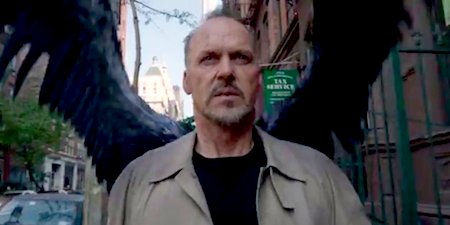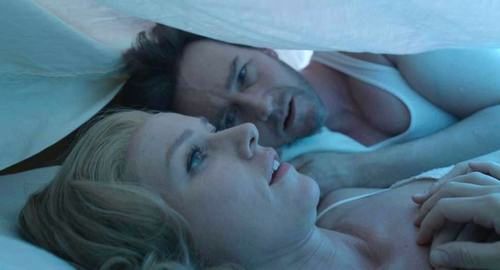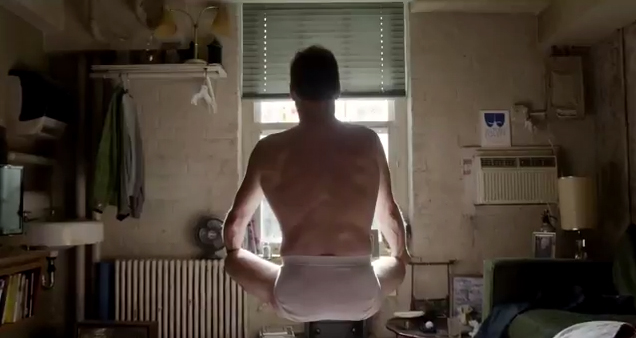An abridged version of this review was originally posted in Nathaniel's weekly column at Towleroad. It is reposted here, with their permission.

A card in the bottom right hand of the star's mirror reads:
"A thing is a thing. Not what is said of that thing."
-Susan Sontag
Which immediately complicates or maybe simplifies celebrity and art, two major themes (among a handful) of Mexican director Alejandro González Iñárritu's one of a kind new film experience. It's destined for major Oscar nominations and you should see it immediately. The movie has the simple and then complicated title of Birdman, Or (The Unexpected Virtue of Ignorance) as befits its duality perfectly. This quote is never addressed in the film but it's always stubbornly lodged there in that mirror, defying or playfully encouraging conversation about what this movie actually is. And what is film criticism or its more popular cousin, after-movie conversation over dinner drinks or online other than conversation that attempts to interpret and define?
Critics are often treated with petulant hostility in movies about show business, as if the filmmakers have an axe to grind and need to do that with grindstone in hand while their critical avatar/puppet hangs there limply, waiting to be struck with the sharpened blade. Birdman is no exception, immediately insulting its formidable theater critic Tabitha (Lindsay Duncan) as having a face that 'looks like she just licked a homeless man's ass,' before she's even spoken a line. But Tabitha is a slippery mark, portrayed as a voice of integrity in one scene and then a vicious unprofessional monster in another. This calls into question the reality of her scenes altogether
... which is not unusual in Birdman.
Is each scene in the movie meant to be taken at face value or are plenty of them partially or fully projections and/or distortions from the actors, warped by ego and neurosis. Birdman is filled with these kind of mindfuck questions while also being completely hilarious and emotionally compelling. The story revolves around a has-been movie star named Riggan Thompson who used to be very famous for playing a superhero. In the movies all-around genius casting he is played by has-been movie star Michael Keaton who used to be very famous for playing a superhero.
Riggan is attempting to regain artistic credibility with a stage comeback. Ignorant of theater or maybe just self-sabotaging, he isn't doing it the easy way movie stars tend to do it by starring in a respected revival but producing, directing, writing, and starring in a new play, an adaptation of Raymond Carver's "What We Mean When We Talk About Love".
Complicating his efforts are a whirlwind of characters including the aforementioned critic, his friend/business partner (Zach Galifanakis), his very difficult acclaimed co-star (played, rather awesomely, by very difficult acclaimed actor Edward Norton), his recovering addict daughter (Emma Stone), his calming ex-wife (Amy Ryan), and two insecure, sexual and talented actresses (Naomi Watts and Andrea Riseborough, both having a ball) who are involved with actors in the play and in life. The biggest obstacle to success however is Riggan's past incarnation, Birdman, who haunts and taunts him; maybe Birdman is all he ever will be?

While the story is dizzying enough what really marks the movie as one-of-a-kind are its meta pleasures and its high-wire aesthetics. Michael Keaton expertly keys back into and twists his old Batman mode, mostly for comedy, in the middle of a nuanced star turn of considerable dramatic range and other meta jokes are everywhere, some intentional others perhaps happy accidents? (Almost the entire film takes place inside the St. James Theater which, coincidentally or not, recently housed Bullets Over Broadway: The Musical, which is, you'll remember, a stage play based on a movie about the staging of a Broadway play with crazy-neurotic actors. A perfect parallel universe companion in a way.)
As for its aesthetics and form, they soar even higher than the not-forgotten superhero in flight. The drum and cymbal score, a very unusual choice, composed by first-timer Antonio Sanchez, contributes greatly to the pressure cooker feeling of the theatrical opening. The showiest contribution is the movie's camerawork.

The cinematography by our most recent Oscar winner and long-time genius Emmanuel Lubeszki (Gravity) is rich in color, ingenuity, and unpredictable movements. No one will complain if Lubeszki wins back-to-back statues. The film is made to look as if it's all filmed in one continuous shot -- as in Hitchcock's Rope you can see where the possible breaks are but here they feel rather richly like act markers or even intermissions. This one shot move makes blocking of the actors and the weaving camera far more important than editing, for a change, in determing the film's mood and perspective shifts.
This long take stunt frees up the actors to do incredibly agile work, sliding nimbly between moods thoughts and feelings without obstruction or manipulation through editing. Take, for just one small example, this scene with Emma Stone as Sam, berating her actor/father/boss. In a normal lesser movie, this would be edited to provide a continual back and forth of closeups, in the generic shot/reverse shot style you see everywhere on film and television. In this abnormal superior movie you get to watch the actors actually act their scenes, often together.
But here you can see Emma's temperature rise. You can trace her character Sam's anger rising and boiling over, and when it begins to evaporate, her face falls as she realizes how cruel she's been. You'd never be able to see this beautiful mini-arc in a movie that was constantly worried about losing your attention and jumping to different camera angles.
Any description of Birdman might make it sound dry, difficult, artistic, and cerebral and while it's definitely cerebral and artistic it isn't remotely dry or inaccessible. The superhero backstory, firmly plays with conventions of mainstream movies, and the drama is surprisingly rooted in the body, given that so many of the scenes might be taking place inside the head. It's jagged with feeling from blood, tears, pheromones, and especially flop sweat as this troupe of actors clash coordinate and claim their characters while their co-star and director, risking humiliating failure with an ambitious career move, lays it all on the line.
I'm talking about the play within the movie. But also, and more importantly, the movie about the play.
How it works out for Riggan Thomson and his play, you'll see in the movie. But how it works out for Michael Keaton and Iñárritu is not just a happy ending but a joyous one. Keaton triumphs with his career best work and Iñárritu, risking failure with this complicated comic detour from his glum and heavy filmography (21 Grams, Amores Perros, Biutiful, Babel), succeeding beyond all expectations. They've made a miracle of a movie together.

Grade: A
Oscar Chances: Voters with more conservative tastes might well be turned off by its conceptual gimmickry but it's also bound to have ardent fans who'll have it at #1 on their ballots all over the place. Expect traction across the board but particular in the Big Eight categories... as well as possibly some craft attention for its technical wizardry. The question is not 'will Birdman be nominated?' but 'how many nominations?'
